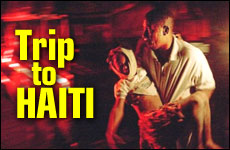 Iran’s Attack on Israel
Iran’s Attack on Israel


3 min read
11 min read
4 min read
4 min read
Opening hearts and wallets for Haitians.
At a Jewish Y on Long Island, Jewish employees take up a collection for the families in Haiti of two maintenance men. In Brooklyn, members of the Orthodox community hold a historic meeting with representatives of the borough’s Haitian-Americans. In southern Florida, a former New Yorker travels to Haiti on short notice to help the relatives of his Haitian-born employees.
Since a devastating 7.0 tremor rocked the Caribbean island last week, leveling much of the capital and taking a total of lives that may exceed 100,000, a cross-section of Jewish institutions and Jewish individuals have offered their financial and moral support to residents of the already indigent nation. Help has come in prayers and hugs, sermons and fundraisers.
Opening their wallets and hearts, Jews have reached out to strangers in Haiti and to fellow New Yorkers of Haitian descent.
“Jews understand what it is to experience suffering,” said Rabbi Joseph Potasnik, executive director of the New York Board of Rabbis, which is arranging new partnerships between local synagogues and Haitian houses of worship.
Many Jewish organizations — including the Jewish Community Relations Council of New York, the National Council of Young Israel, and Agudath Israel of America — advised members about worthy charitable recipients spearheading the relief effort.
In Brooklyn, Jewish community leaders, many representing the Orthodox community, met with local elected officials who represent the largest Haitian community in the United States outside of Florida. The Jewish leaders presented the Haitians with satellite phones and computers for contacting relatives in Haiti.
Marc Eisenmann, a Manhattan native who for six years has lived in Florida, where he owns an assisted-living facility, decided to go to Haiti the morning after the earthquake struck.
A veteran member of the Hatzolah emergency ambulance service, he planned to lend his medical expertise and find the relatives of his facility’s many Haitian employees.
With no prior contacts in Haiti, with a bagful of kosher challah rolls, accompanied by a Haitian-born staff member, he flew, on a one-way ticket, to the neighboring Dominican Republic, planning to stay until early this week.
The pair found a ride to the border, in a four-hour drive, in the back of an ambulance. Using his “street smarts,” he talked his way across the border, paid a Haitian guide $350 for the hour’s ride to Port-au-Prince, found a room in a still-intact hotel occupied by CNN employees and volunteered to rescue trapped people around the city. He pulled people out of buildings, perilously crawled under collapsed structures and offered basic first aid to the injured as well as comfort to parents whose children were beyond help.
“You have to have a heart. There’s nothing worse than apathy.”
Then Eisenmann met Gancci Saintellus, the 5-year-old son of his hotel’s desk clerk. The child’s arm was mangled; gangrene was setting in. He needed advanced medical care or would die within half a day.
Eisesmann heard that some planes were leaving the Port-au-Prince airport. At the airport, on the tarmac, hoping to get Gancci on a plane going somewhere where proper treatment was available, he talked himself, the child and the child’s father, Olgan, onto an empty Sky King Airlines 373 bound for Miami. The Saintelluses had no passports, no credentials for entering the U.S.
En route, the pilot arranged for an ambulance to meet the plane at the airport. Eisenmann, dressed in EMS garb, throwing out medical terms, convinced immigration authorities to let father and son enter the country.
Gannci’s right arm was amputated two hours later at Holtz Children’s Hospital, but he’s alive.
Eisenmann, who had slept three hours during the previous two days, caught a few hours of rest at home, then returned to the hospital, accompanied by one of his children, to visit the recuperating youngster on Friday, before Shabbat.
Now, Eisenmann, who is active in Hollywood’s Orthodox community and whose children attend the city’s Brauser Maimonides Academy day school, is working to bring the rest of the Saintellus family — mother and two daughters, all Mormons — to Miami. When the child is discharged from the hospital, he and his father will stay with the Eisenmanns.
Was Eisenmann scared at anytime during his time in Haiti?
“I questioned my sanity,” he answers.
But, Eisenmann adds, he felt he had no choice. “You have to have a heart,” he says. “There’s nothing worse than apathy.”
This article originally appeared in The Jewish Week.
